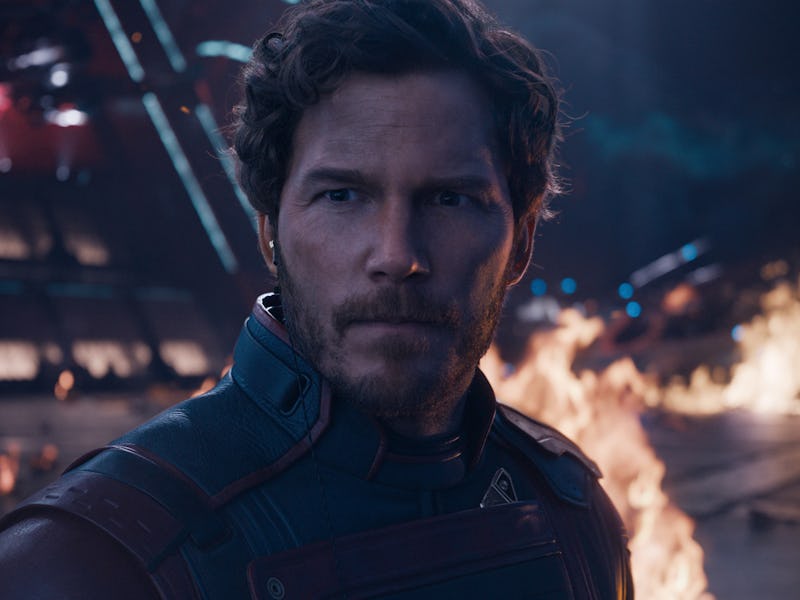Guardians of the Galaxy 3 Proves Marvel’s Most Annoying Bad Habit Can’t Be Broken
Let superheroes retire.

All it took was three words at the end of Thor: Love and Thunder for me to spiral: “Thor Will Return.”
After months of a promotional cycle that weaponized the romantic sentimentality of “Sweet Child O’ Mine” by Guns N’ Roses, Marvel pulled a fast one. With all of Phase Four themed around growth and change — and most of his fellow Avengers cast retired from active duty — Chris Hemsworth was out there making Love and Thunder look like his victory lap before handing off the hammer to Natalie Portman. After all, Thor’s “superheroing days are over,” or so he said in the trailer. And Portman was making a buzzy return to tell the tale of her Jane Foster, who replaced Thor in the comics as the new, well, Thor — if only for a time.
But then there’s the actual ending of Love and Thunder. Thor is still going on adventures (with an adopted daughter) and Jane Foster is dead in Valhalla. Because even the deceased get sequels in the Marvel Cinematic Universe.
Forget that Hemsworth is now promising Thor 5 will be his last. The mighty and maddeningly ambiguous statement that “Thor Will Return” doesn’t cultivate speculation over which Thor will return in some future movie so much as it underlines Marvel’s utmost priority above sensible storytelling: To keep its franchise money fountain flowing at all times.
Unfortunately, the same now goes for another Marvel franchise eagerly promising a definitive conclusion.
With Thor: Love and Thunder, Chris Hemsworth seemed ready to hang up Mjolnir when he declared, “My superhero-ing days are over.” But the end credits reveal he’s not done yet, even when he should be.
Shades of this infuriating Marvel habit were felt again at the end of Guardians of the Galaxy Vol. 3. While Gunn’s final Guardians movie (that he’s directing, anyway) fares better than Thor: Love and Thunder as the complete package and even succeeds on the Multiverse Saga’s recurring theme of ruthless self-interrogation before growth, Vol. 3 still partially succumbs to Marvel’s terrible post-Endgame practice of refusing to just let characters go.
Sure, in the case of Guardians, there’s something symbolic in letting Rocket (voiced by Bradley Cooper) take charge of the Guardians after so many movies where he’s been lost and listless. But like Love and Thunder, Guardians 3 set expectations it couldn’t follow through on. The posters highlighted Rocket, who indeed was the star of the movie but didn’t meet a fate its morbid tones suggested. We’ll see Rocket again, never mind that his character arc is complete. That’s going an awful lot of VFX money for a character who is going to just, I dunno, be there during Secret Wars.
Then there’s Chris Pratt’s Star-Lord. Long the face of the trilogy, Marvel’s refusal to let him go, like Rocket, holds back what should have been a perfect ending for Star-Lord in his reunion with his grandfather in Missouri. “Great! End it there!” I internally screamed. But alas. The movie’s post-credits confirm it shall be Star-Lord who will return to the MCU, as if watching Peter take sociology at St. Louis Community College is riveting content for Disney+. (Actually, let’s be real, I would totally watch that show.)
Guardians of the Galaxy Vol. 3 altogether brings a more definitive sense of closure for its characters. But with their residence in the MCU, their stories are still open to return even if it betrays the completeness of the trilogy.
Why is Marvel so afraid to let its characters meet their logical end? Yes, Marvel’s movies are based on comics whose characters have remained constant and never change. But given that movies are a different medium, the “adaptation” part in comic book movie adaptations should mean more than condensing a miniseries arc into a two-hour feature. Just as the most iconic heroes and villains of cinema have a limited lifespan, so too should Marvel’s superheroes.
It’s not worth getting angry over a billion-dollar studio’s marketing that lies by omission. And in fairness, no one from Marvel said these movies were ending the stories. But with Marvel fans still seeking clear direction from the franchise after Endgame, the studio’s insistence on playing the same “wait and see” game over its grand plans doesn’t work like it used to. A sense of closure — for Thor, for Rocket, for Star-Lord, for anybody! — would be welcome right now. If only Marvel didn’t think we’d come back for more.
This article was originally published on